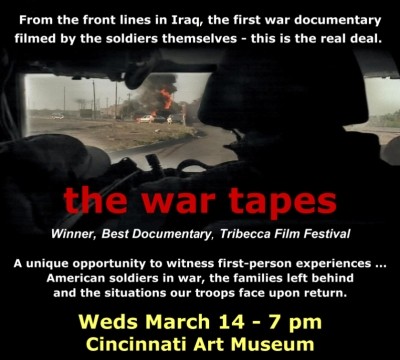W H A T :
Director Deborah Scranton, 2006, USA, color, 97 minutes.
W H E N :
Wednesday, March 14 - 7:00 pm
W H E R E :
click for Directions & Map
A D M I S S I O N :
There are two ways to get tickets:
(If the above link does not work for you, cut and paste the URL into your browser window. Alternatively, go to dfalink.com, click on events and your zipcode - you should be taken to the War Tapes RSVP page.)
Out-takes & NYT Review
The following film clips contain scenes of WAR - graphic images, strong language, etc. Viewer discretion is advised.
The War Tapes Trailer
Clips & Outtakes
Read the New York Times review
The War Tapes Trailer
Clips & Outtakes
Read the New York Times review

About the Film
NOTE TO PARENTS: This film is not rated. We suggest a "PG-13" at minimum and more likely an "R" -- this is about WAR, with strong language, scenes of combat, death and destruction.
How does one shoot a weapon and film a war at the same time? It is not easy, but the soldier/cameramen in Charlie Company give us an insider's perspective that transcends the contrived realism of "Saving Private Ryan" or the brief clips on the evening news. A soldier's camera bounces around the insides of a Hummer as it plows through a hail of bullets or races through the clouds of car bombs detonating a few yards away. An incinerated body slumps from a shredded vehicle. A voice shouts "Sgt. Smith is down! Sgt. Smith is down!
Director Scranton's volunteer cameramen represent a range of personalities, backgrounds and political beliefs. What binds them together is their desire to be in the thick of the action. The focus is not on the government's strategy, or lack thereof. It's on individual guardsmen before, during, and after their time in Iraq. And what we see is not so much war as hell but war as a corrosive mixture of hell and limbo, with carnage so ubiquitous and random that it might be laughably absurd if it weren't so tragic.
Excerpts from the fimmaker's synopis and production notes continue in the next panel, below.
Programming Note
Since the war in Iraq began, CWC has considered numerous documentaries about the war. Some of them were well-made, most took strong positions and virtually all were available to the public through a variety of sources. Previously, we've elected to present rarely-seen high-profile classic films that examine somewhat similar themes at different points in recent history: THE BATTLE OF ALGIERS and ARMY OF SHADOWS.
Last year two excellent documentaries about Iraq emerged that offer unique points of view, are cinematically creative and highly informative. Both films made the Oscar short list, qualifying for consideration in the feature-length documentary category at the 79th Annual Academy Awards and IRAQ IN FRAGMENTS was elevated to one of the five Oscar nominees. And, both did well in major festival competition - THE WAR TAPES won Best Documentary at the 2006 Tribecca Film Festival, and IRAQ IN FRAGMENTS was winner of Best Director, Best Cinematography and Best Editing awards at the 2006 Sundance Film Festival documentary competition.
War may be waged by nations, but it is experienced by people, which is exactly why we've selected these two particular films: both are about everyday people and how they react and survive in times of war. These are people with whom the majority of Americans have little actual contact - people we read about or see on TV, people from disparate cultures: our soldiers on the battlefield and their families back home; and the Shia, Sunni and Kurdish peoples of Iraq.
Here's another plus: these filmmakers believe that audience members have sufficient intelligence to form their own reasoned opinions, without the influence of bombastic diatribe. Neither film takes a position for or against the war, but instead allows the viewer to digest the material without polemicizing or attempting to indoctrinate.
Cincinnati World Cinema is proud to present THE WAR TAPES, on March 14, and IRAQ IN FRAGMENTS on March 20 and 21. As the subject matter is complimentary but the perspectives are diverse, we believe your experience will be enriched by viewing both films. When you attend these films we hope you will stay for the post-film discussions and share your thoughts. All opinions and viewpoints are welcome and will be respected.